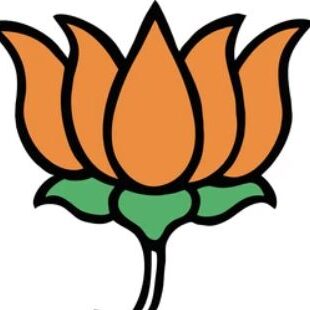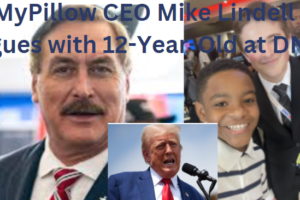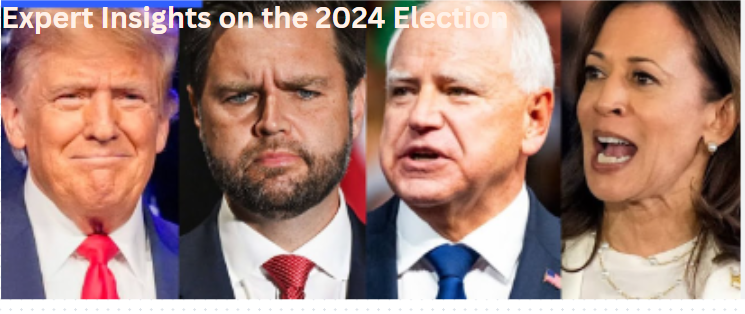Expert Insights on the 2024 Election

An elaborate report on expert opinions comparing Kamala Harris and Donald Trump in the 2024 U.S. presidential election, including international perspectives and a programmatic analysis:
Expert Opinions on the Harris vs. Trump Matchup
1. Nate Silver, FiveThirtyEight
- Silver’s data-driven analysis projects Harris having a 53% chance of winning the Electoral College, with 277 predicted votes compared to Trump’s 260.
- He notes fluctuations in Harris’s probability of victory as the campaign progresses, indicating the competitive nature of the race.
2. Andy Crosby, UC Riverside
- Crosby emphasizes the importance of state-level polling over national polls in predicting electoral outcomes, particularly in battleground states.
- He highlights Harris’s favorability ratings improving significantly since Biden’s withdrawal and the potential impact of her running mate choice on polling dynamics.
3. Tony Fabrizio, Trump Campaign Pollster
- Fabrizio anticipates a “Harris Honeymoon” period following her campaign launch, suggesting her initial surge in polls could invigorate Democratic enthusiasm.
- He acknowledges Trump’s support remains steady but notes the race’s dynamics could shift as voters become more familiar with Harris.
4. Diane Hessan, Boston Market Research Expert
- Hessan’s long-term panel data suggests voters will largely vote against the other side rather than for their preferred candidate.
- She identifies key challenges for Harris, including perceptions of being too progressive and lacking gravitas, especially on foreign policy and immigration issues.
5. Christoph von Marschall, Der Tagesspiegel (Germany)
- Von Marschall highlights the global implications of the U.S. election, noting that “the world is watching” and that the outcome will significantly impact international relations.
- He emphasizes the stark contrast between Harris’s vision of strengthening alliances and Trump’s “America First” approach, which often clashed with U.S. allies.
6. Gideon Rachman, Financial Times (UK)
- Rachman argues that a Trump victory would be seen as a “triumph for populism” worldwide and could embolden authoritarian leaders to challenge the liberal international order.
- He suggests that Harris’s election would be welcomed by U.S. allies seeking a return to more predictable and multilateral foreign policy.
7. Yuriko Koike, Governor of Tokyo, Japan
- Koike expresses concern over the potential impact of a Trump presidency on U.S.-Japan relations, noting the importance of stable leadership in Washington for Japan’s security and economic interests.
- She praises Harris’s experience in foreign policy and her commitment to strengthening alliances in the Indo-Pacific region.
8. Brahma Chellaney, Strategic Studies Expert, India
- Chellaney argues that a Harris presidency would likely maintain a tough stance on China while seeking to repair relations with traditional U.S. allies in Asia.
- He suggests that Trump’s unpredictability and “America First” approach have created uncertainty in the region and that a return to a more consistent and engaged U.S. foreign policy under Harris would be welcomed by many countries.
9. Volodymyr Zelenskyy, President of Ukraine
- Zelenskyy emphasizes the importance of U.S. leadership in supporting Ukraine’s fight against Russian aggression and notes that the outcome of the U.S. election will significantly impact Ukraine’s ability to secure a lasting peace.
- He expresses confidence in Harris’s commitment to Ukraine’s sovereignty and territorial integrity but acknowledges the need to work with whichever candidate emerges victorious.
10. Federica Mogherini, Former EU High Representative for Foreign Affairs
- Mogherini argues that the U.S. election will have profound implications for the future of the transatlantic relationship and the global liberal order.
- She suggests that Harris’s election would likely lead to a more cooperative and multilateral approach to global challenges, while a Trump victory could further strain relations with European allies and undermine international institutions.
Programmatic Analysis
A programmatic analysis of the Harris vs. Trump matchup reveals several key factors that will shape the outcome of the election:
- The State of the Economy: Voters’ perceptions of economic performance, particularly on issues like inflation and cost of living, will be a significant factor.
- Demographic Shifts: Harris’s ability to mobilize and turn out key Democratic constituencies, such as young voters, racial minorities, and college-educated voters, will be crucial.
- Foreign Policy and National Security: Voters’ assessments of the candidates’ experience, competence, and vision on foreign policy and national security issues will play a role, especially in light of ongoing global challenges.
- Candidate Favorability and Trustworthiness: Voters’ personal impressions of the candidates, including their perceived integrity, leadership qualities, and ability to unite the country, will influence their voting decisions.
- The Role of Partisanship: Despite the importance of these factors, the election will ultimately be shaped by the deep partisan divisions in the country, with many voters likely to support their party’s nominee regardless of other considerations.
In conclusion, the 2024 U.S. presidential election between Kamala Harris and Donald Trump is shaping up to be a high-stakes contest with significant implications for both domestic and international affairs. While Harris appears to have gained momentum following her nomination, the race remains competitive, and the outcome will depend on a range of economic, demographic, and political factors.











